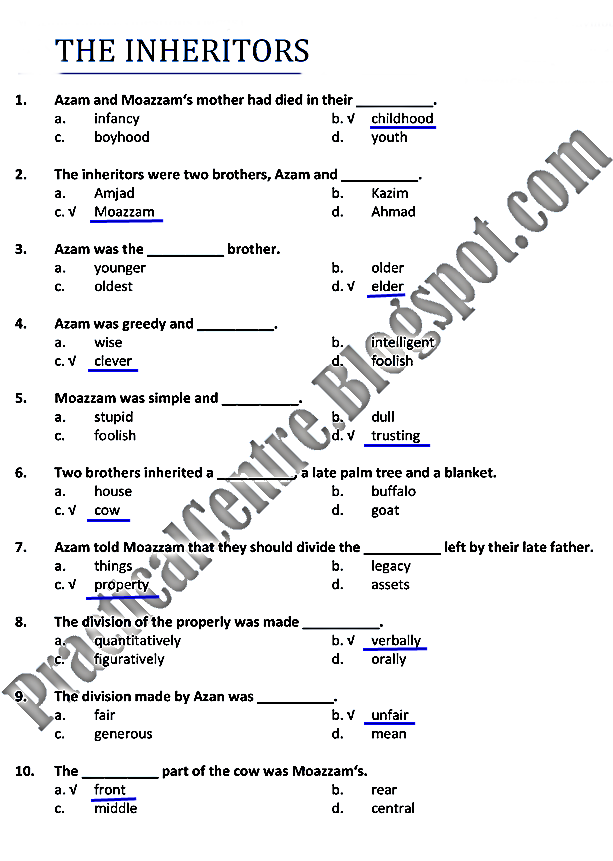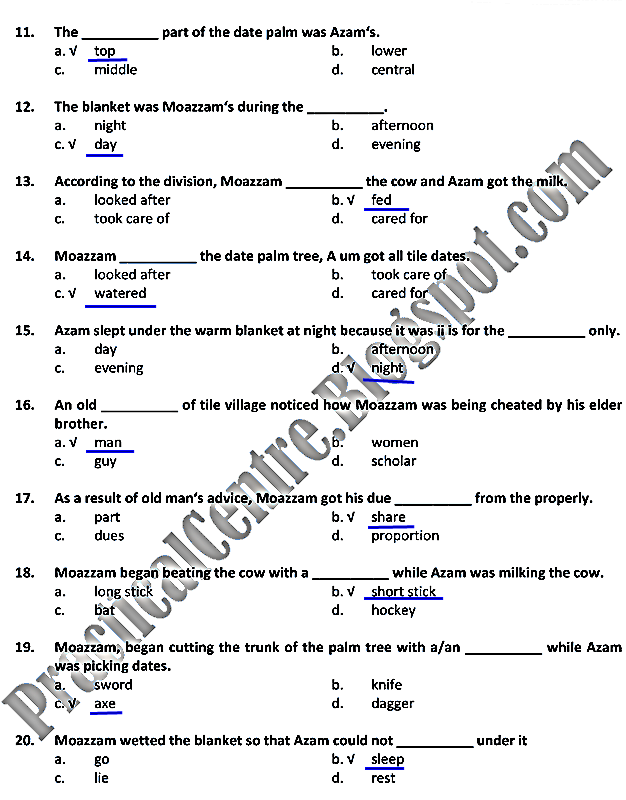Go To Index
CASABIANCA (POEM)
Questions-Answers and Text Book Exercise
Q.1: Write a short note on Casabianca? OR Who was Casabianca? OR What do you know about Casabianca?
Ans. Casabianca was a young boy and a brave soldier. His father was the captain of the battleship. He had ordered his son not to move from his place without any further order from him. During the battle, the ship caught fire. Casabiamca asked his father again and again if he could leave his place in order to save his life. But there was no reply as the captain was dead. Casabianca proved himself to be very obedient and faithful son and a disciplined soldier. He laid down his life in carrying out his duties but he did not disobey his father.
Q.2: What do you know about a battleship from this poem?
Ans. As the poem was written in the 19th century, in these days ships were made from wood. The battleship has many things in common with a civilian ship. It has a deck with different parts like mast, helm, pennon. Moreover cannon balls are also fixed on it for destruction purposes.
Q.3: Who has written the poem "Casabianca"? What do you know about poet /poetess?
Ans. This poem is written by Felicia Dorothea Hemans (1793-1835). She was born at Liverpool, but the family moved to Wales where she was brought up. She was quick in mind and had a fine memory. As a poet, she has been compared to Longfellow. Like Cowper, she loved the pathetic, and there is great enthusiasm for chivalry and heroism in her work. She also stressed moral values.
Q.4: How has the Felicia Dorothea Hemans been compared to other poets?
Ans. Felicia Dorothea Hemans has been compared to Henry Long Fellow and Cowper. She had the same pathetic and there is a great enthusiasm for chivalry and heroism in her work like the other poets. She also stressed moral values.
Ans. Felicia Dorothea Hemans has been compared to Henry Long Fellow and Cowper. She had the same pathetic and there is a great enthusiasm for chivalry and heroism in her work like the other poets. She also stressed moral values.
Q.5: What does the poetess mean by saying that “Lone Post of Death”?
Ans. The poetess is describing the death scene of Casabianca through the phrase. It means that when the fire was near to engulf him and his death time had arrived, he felt his heart on his forehead and in waving hair. He stood quite and calm and looked around him with bold heart though he was disappointed.
Ans. The poetess calls the Casabianca “a gallant child” because he stood like a rock and fearless in the fire and the enemy’s shelling. He was despair in the moments of death and danger. When his body blown into bites and he was defeated by the death, his spirit was not overpowered and he remained as a brave and valiant soldier.
Q.7: What lesson do we learn from this poem? OR What is the message of the poem?
Ans. From this poem, we learn the lesson that we should obey our parents under all circumstances and at all times. We should be ready even to sacrifice our life for our parents.
OR
In the poem poetess conveys the message of bravery, sacrifice, responsibility, patriotism and discipline through the story of Casabianca.
Q.8: What is the noblest thing referred to by the poetess in this poem?
Ans. The noblest thing that was burnt by fire in the battleship was the young noble heart of Casabianca. The poetess calls it the noblest thing because this heart was obedient, disciplined and faithful.
Q.9: What quality did the boy in " Casabianaca" possess? OR Casabianca shows the true spirit of soldier comment?
Ans. Casabianca was a young and brave soldier of his country. He was a born hero and was loyal, disciplined, obedient and true patriot. The entire poem revolves around excellent scene of dutifulness and responsibility. He kept waiting for his father's permission and never left the duty post. He sacrified his life for his life for the sake of his country.
Q.10: Why did the Casabianca not leave the burning deck?
Ans. Casabianca did not leave the burning deck because his father, the captain of the ship, had told him not to leave the deck without his permission. Though he kept on asking for his orders, he did not know that his father lay unconscious. He preferred death, but did not defy the orders.
B. Words / Meanings
Words / Meaning
| S.No. | Words | Meanings |
| 1. | A banner | A flag or standard |
| 2. | The battle's wreck | The ship had become a wreck after being damaged in the fighting |
| 3. | To boom | To make a deep, echoing sound as of guns. |
| 4. | Chieftain | A chief: a leader |
| 5. | The deck | The floor of a ship |
| 6. | Gallant | Brave |
| 7. | Helm | Wheel for steering a ship |
| 8. | Heroic blood | The blood of great and noble people; the boy had inherited greatness and nobility from his forefathers |
| 9. | The mast | A thick tall pole of wood or metal to which a ship's sails are tied |
| 10. | A pennon | A narrow flag flown from the top of the mast |
| 11. | A shroud | One of the ropes stretching from the mast to the side of a ship |
| 12. | Strewed | Covered with small pieces |
| 13. | Unconscious | Unaware; Not knowing |
| 14. | Wrapt | Wrapped |
C. Non Textual:
1. Forming of questions:
Example: "This is the correct time." (Change into question)
Is this the correct time?
Exercise: Change into question
1. You were present yesterday.
Ans. Were you present yesterday?
2. You are eating in the class.
Ans Are you eating in the class?
Example:
What are you writing?
Where are you going?
Exercise: Complete the following questions by adding:
Who, What, Where, When, Whom
1. What are you saying?
2. Where are you going?
3. When are you coming?
4. Whom are you calling?
5. Who are you?
2. Short answers:
Example:
Did you come by bus?
Yes, I did.
Did you come walking?
No, I didn't.
Exercise: Answer the question by using "Yes" or "No" with a short reply.
1. Are you a student of Class X?
Ans. Yes, I am.
2. Do you study in Class VIII?
Ans. No, I do not.
3. Do you have many students in your class?
Ans. Yes, I have.
4. Do you pay fees?
Ans. Yes, I do.
3. Question tags:
Example:
It's easy, isn't it? (Positive form)
It isn't easy, is it? (Negative form)
Exercise: Write the positive forms of the question tags below:
Negative form: I can't come, can I?
Positive form: I can come, can't I?
Negative form: You didn't go, did you?
Positive form: You went, didn't you?
Negative form: He doesn't live here, does he?
Positive form: He lives here, doesn't he?
Negative form: She doesn't cook, does she?
Positive form: She cooks, doesn't she?
Negative form: You didn't lose it, did you?
Positive form: You lost it, didn't you?
4. Must
Example: I must go now
Exercise: Use must instead of "obliged to"
1. A man is obliged to pay his debts.
Ans. A man must pay his debts.
2. A citizen is obliged to do his duty.
Ans. A citizen must do his duty.
5. Want somebody to do something:
Example: I want to suggest a colour scheme for my house.
Exercise: Join two sentences into one:
His parents force him. They make him study two hours daily.
Ans. His parents suggest him to study two hours daily.
6. Have to:
Example: We have to wear our uniforms every day.
Exercise: We must eat wholesome food to stay healthy.
(Use "have to" instead of "must")
Ans. We have to eat wholesome food to stay healthy.
7. Ought to:
Example: We ought to be kind to the poor.
Exercise: Use "ought to" instead of "should"
We should show sympathy to those who are sick.
Ans. We ought to show sympathy to those who are sick.
8. Try to:
Example: He tried to escape from prison.
Exercise: Use "try to" instead of "made an attempt to."
He made an attempt to save her from drowning.
Ans. He tried to save her from drowning.


